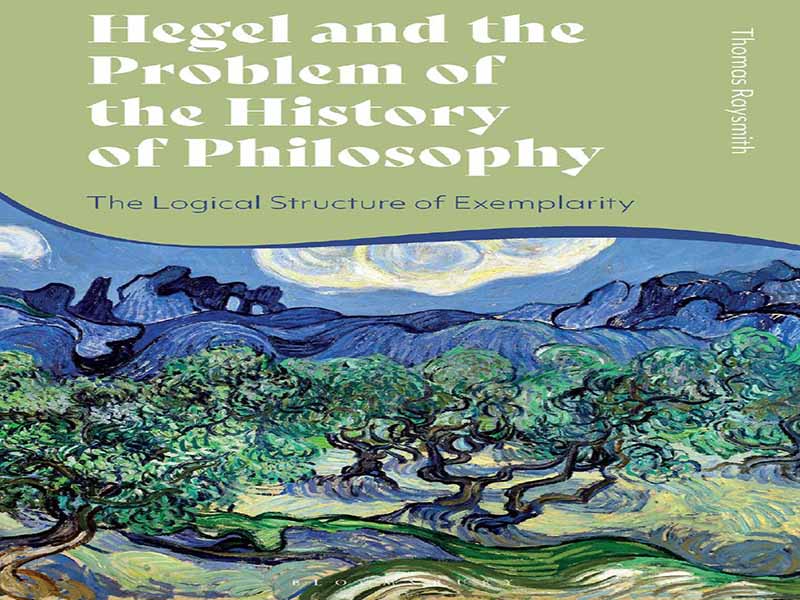- عنوان کتاب: Hegel and the Problem of the History of Philosophy
- نویسنده: Thomas Raysmith
- حوزه: تاریخ فلسفه
- سال انتشار: 2025
- تعداد صفحه: 233
- زبان اصلی: انگلیسی
- نوع فایل: pdf
- حجم فایل: 3.37 مگابایت
گئورگ ویلهلم فردریش هگل در مقدمه سخنرانیهای خود درباره تاریخ فلسفه بیان میکند که داشتن «عقلانیت خودآگاه» نمیتواند خود به خود یا صرفاً از شرایط کنونی فرد ناشی شده باشد (VGP 13: 12). هگل ادعا میکند که این یک دستاورد تاریخی است که از نسلهای پیشین به ارث رسیده است. هگل از «عقلانیت خودآگاه» به معنای تفکر یا تفکر خودبازتابی است که در مورد خودش است. یکی از دلایلی که هگل ادعا می کند که تفکر خود بازتابی تاریخی است این است که در وهله اول باید درباره تفکری باشد که خود بازتابی نیست، یعنی. در مورد چیزی غیر از فکر است، به عنوان مثال. طبیعت و تفکری که در مورد طبیعت است از نظر تاریخی مشروط است. از مفاهیم و حرکات استنتاجی استفاده میکند که از نسلهای قبلی آموخته شدهاند و از تاریخچههای علوم طبیعی و تعامل انسان با طبیعت مطلع شدهاند. به عقیده هگل، فلسفه محصول تفکر خود بازتابی است و بنابراین به نظر می رسد تاریخی نیز باشد. به نظر می رسد، همانطور که هگل بیان می کند، «فلسفه ما فقط می تواند در پیوند با فلسفه قبلی، که از آن ضرورت ناشی شده است، به وجود بیاید» (VGP 13: 14؛ LHP 1: 3-4 – ترجمه اصلاح شده). با این حال هگل بیان میکند که این ادعا که فلسفه تاریخی است، و موضوع تاریخ فلسفه، که این ادعا را پیشفرض میگیرد، ظاهراً حاوی یک «تضاد درونی» است (VGP 13: 19؛ LHP 1: 7). اغلب ادعا می شود که فلسفه حقایق ابدی و لایتغیر را کشف و ارائه می کند. با این حال، تاریخ یک فلسفه یا حتی بسیاری از فلسفههای منطبق را ارائه نمیکند که هر کدام به نظام منسجمی از حقایق میافزایند. هگل اظهار میدارد: «به نظر میرسد صرفاً استطاعت میدهد»، «منظره تغییرات دائمی در کل، که در نهایت حتی با یک هدف مشترک مرتبط نیستند» (VGP 13: 22؛ LHP 1: 10). تاریخ نظامهای بسیاری را ارائه میدهد، که طرفداران هر یک ادعا میکنند که فلسفهی خود را یک فلسفه واقعی و بقیه را نادرست میدانند. بنابراین به نظر میرسد که تاریخ فلسفه نمیتواند وجود داشته باشد، بلکه فقط تاریخچه ای از «نظرات [Meinungen]» متضاد وجود داشته باشد (VGP 13: 22؛ LHP 1: 11). هگل در سبک منحصربهفرد خود توضیح میدهد که اگر فیلسوفان خودخوانده گذشته را در نظر بگیریم، تاریخ فلسفه تبدیل به «پادشاهی میشود که صرفاً از افراد مرده و بیجان تشکیل نمیشود، بلکه از نظامهای [geistig vorbeier] ابطالشده و روحاً مرده تشکیل شده است، زیرا هر یک دیگری را کشته و دفن کردهاند» (LG 29P).
In the introduction to his Lectures on the History of Philosophy (Vorlesungen über die Geschichte der Philosophie), Georg Wilhelm Friedrich Hegel states that a person’s possession of ‘self-conscious rationality [selbstbewuكter Vernünftigkeit]’ cannot have arisen spontaneously or solely from the person’s present circumstances (VGP 13: 12). It is, Hegel claims, an historical achievement inherited from previous generations.1 By ‘self-conscious rationality’ Hegel means self-reflexive thought or thought that is about itself. One reason Hegel claims that self-reflexive thought is historical is that, in the first instance, it must be about thought that is not self-reflexive, i.e. it is about something other than thought, e.g. nature. And thought that is about nature is historically conditioned. It employs concepts and inferential moves that have been learned from previous generations and is informed by the histories of, e.g., the natural sciences and human interaction with nature. Philosophy, according to Hegel, is a product of self-reflexive thought and thus would also seem to be historical. It would seem, as Hegel puts it, ‘that our philosophy can only come into existence in connection with previous philosophy, from which of necessity it has arisen’ (VGP 13: 14; LHP 1: 3–4 – translation modified). Yet Hegel states that the claim that philosophy is historical, and the very subject of the history of philosophy, which presupposes this claim, appears to contain an ‘inner contradiction’ (VGP 13: 19; LHP 1: 7). Philosophy is often claimed to discover and present eternal and unchanging truths. History, however, does not deliver one philosophy or even many concordant philosophies, each adding to a coherent system of truths. ‘It seems merely to afford’, Hegel asserts, ‘the spectacle of ever-recurring changes in the whole, such as finally are no longer even connected by a common aim’ (VGP 13: 22; LHP 1: 10). History delivers many systems, with the proponents of each claiming theirs to be the one true philosophy and the others to be false.2 It would thus seem that there can be no history of philosophy but only a history of conflicting ‘opinions [Meinungen]’ (VGP 13: 22; LHP 1: 11) or what may otherwise be called a history of ideas. In his unique style, Hegel explains that if we take the self-proclaimed philosophers of the past at their word, then the history of philosophy becomes ‘a kingdom not merely formed of dead and lifeless individuals, but of refuted and spiritually dead [geistig vergangener] systems, since each has killed and buried the other’ (VGP 13: 29; LHP 17).
این کتاب را میتوانید بصورت رایگان از لینک زیر دانلود نمایید.
Download: Hegel and the Problem of the History of Philosophy





































نظرات کاربران